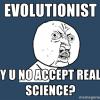Recommended Posts
Recommended
"...you ##### ignorant twonk."
There is a common pattern among evolutionists who come to EFF. Not applicable to all of them of course...but the common strain is seen in those who come here with the typical over-confident, condescending attitude and they are quite sure it's going to be a piece-of-cake to handle us Bible thumpers and it will be easy to show us how ignorant and foolish our ideas and beliefs are. But after about a week or less they soon realize that it was not the snap job they thought it would be and frustration sets in quickly when we lay before them objections to their theories and questions that they had never been confronted with before. Then comes the hate, the foul language, and the utter contempt they have for us (which of course, is actually resentment against the Creator and Lord of all. The thought of accountability to such a Being irks them).
The truth is that they don't like being confronted with the real truth about the pitiful excuse of a theory they have accepted, nor the reality that they have utterly no evidence to support their position, and that after all things considered they have placed their faith and trust in an idea that they are utterly unable to defend adequately. THAT is the real reason for the vitriolic language and hateful attitude in the hours (or days) before they depart from us...or are kicked off the board.
So true!
Recommended by mike the wiz
Sign in to follow this
Followers
0

